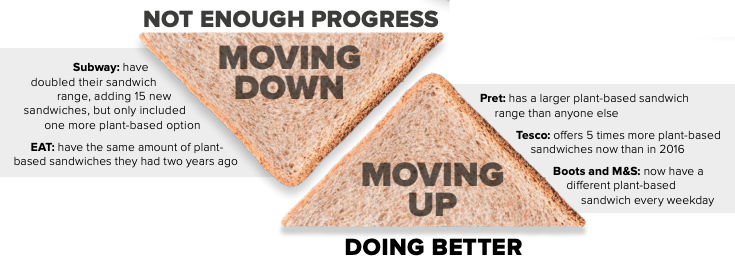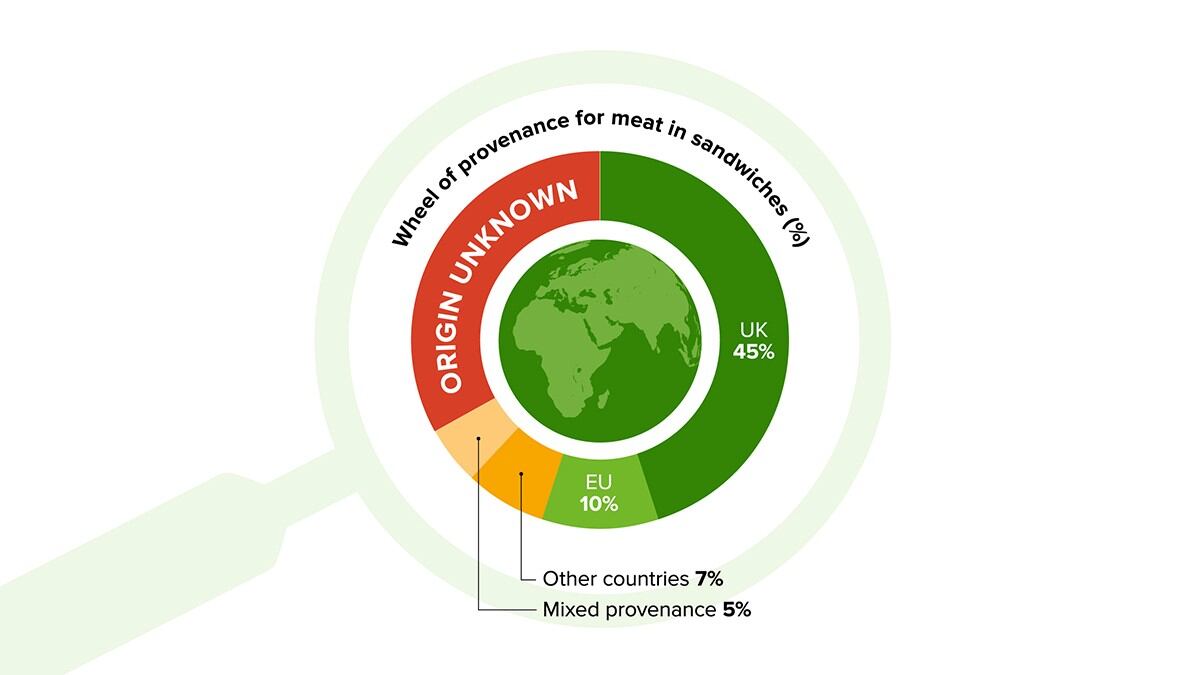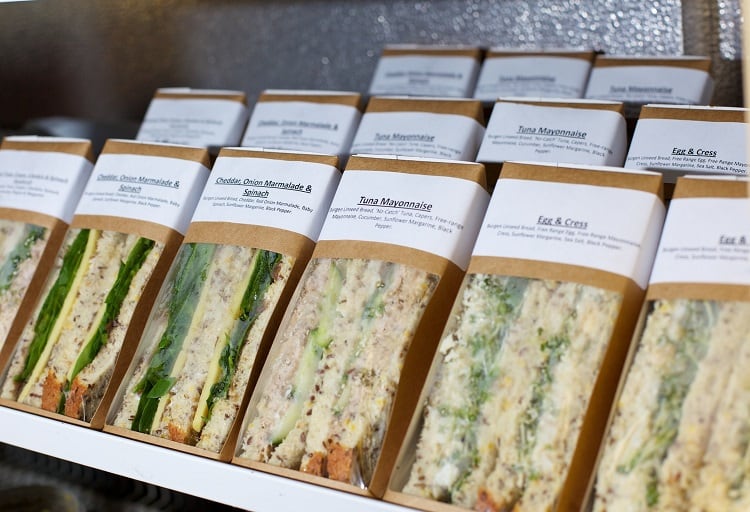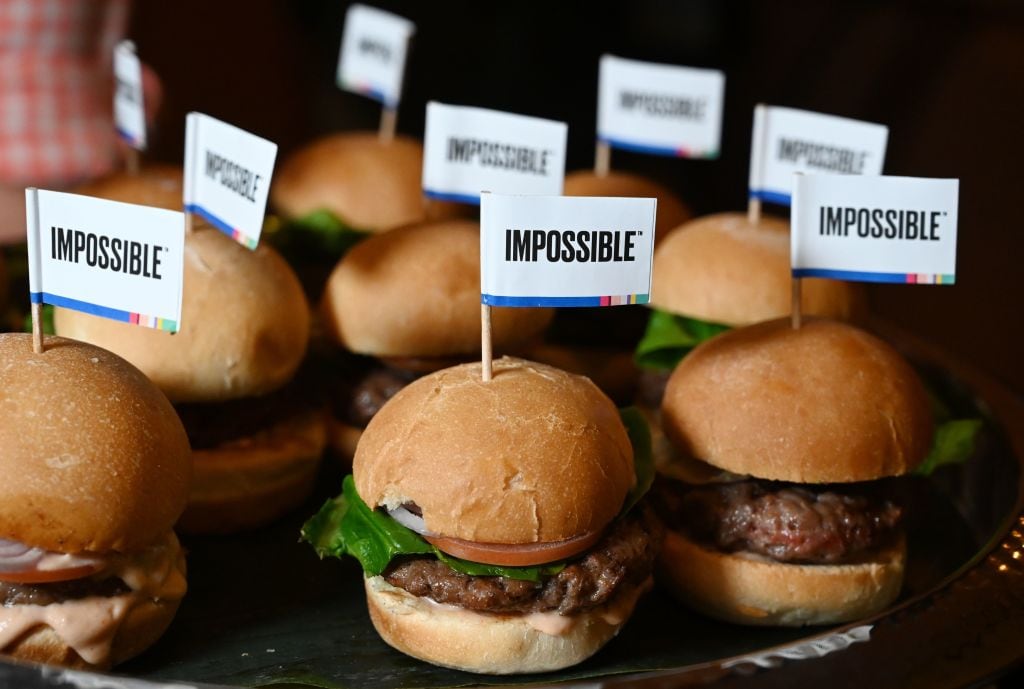Approximately four billion sandwiches are purchased from UK retail or catering operators annually, according to statistics from the British Sandwich & Food to Go Association.
With a sandwich costing an average of £2.14 in the UK, the association predicts that consumers are spending more than £8bn per year on the classic British staple. Statistics also reveal that 76% of consumers buy lunch to eat out of home for an everyday occasion.
Running alongside this convenience-driven trend is a change in consumer preferences. Increasingly, UK consumers are seeking out vegetarian and vegan offerings in the food-to-go sector. Indeed, 48% of people in the UK are willing or already committed to cutting down, or cutting out, meat.
So are retailers responding to growing demand for plant-based alternatives? A snapshot survey coordinated by Eating Better – an alliance that advocates for less and better meat and dairy consumption – has investigated which brands are a cut above the rest in the plant-based sandwich category.
Plant-based range growing, but more can be done
The survey assessed 620 sandwiches sold at eight supermarket retailers: Asda, Boots, Co-op, Marks and Spencer (M&S), Morrisons, Sainsbury’s, Tesco, and Waitrose, and four high street sandwich chains: EAAT, Greggs, Pret a Manger, and Subway.
Eating Better found that 85% of sandwiches on the market still contain meat, fish or cheese as their main ingredient.
However, compared to Eating Better’s 2016 survey, plant-based options are on the rise: 57 out of the 620 (9%) sandwiches judged were plant-based, marking a 5% increase.
Tesco offers five times as many plant-based sandwiches than it did two years ago (from 2 to 10), with Pret a Manger leading the charge with 14 plant-based sandwiches in their stores.
And other retailers are following suit. This year alone, Sainsbury’s added 25 plant-based products to its private label range, Waitrose boosted its own label range with 14 new vegan offerings, and Boots introduced two new vegan sandwiches.
“Pret is streets ahead of everybody in terms of their range. That is [largely] led by the fact that they have Veggie Pret stores as well,” Eating Better spokesperson Mark Breen told FoodNavigator.
“Tesco has done an awful lot with their Wicked Kitchen label to increase their range of plant-based products,” he added. “But a lot of retailers aren’t doing [as] well.”
“The good news is that some retailers are responding to consumer demand for more plant-based options. But given the urgency of our climate and biodiversity crisis they need to double down on their efforts to support options that are better for the environment” – Simon Billing, executive director of Eating Better
Despite these efforts, Eating Better noted that plant-based options are still very limited. Six out of 12 supermarkets have meat, fish or cheese as their main ingredient, and vegetarian sandwiches regularly contained dairy products. Indeed, 49% of all vegetarian sandwiches were cheese-based.

“We want [retailers] to increase their range of plant-based sandwiches,” Breen continued. "We want them all to 'do a Pret' basically.
“I think some other players on the high street have something to learn from Pret in terms of range.”
Lack of transparency for consumers in meat supply chain
The survey also revealed a lack of clarity for consumers regarding the origin of meat and farming methods in the retailers’ own label meat sandwiches. 33% of meat sandwiches contained meat of unknown origin, including all meat sandwiches at Subway and Boots.
Asda, Co-op, Morrisons, M&S and Waitrose display the origin of the meat used for all sandwiches. EAT, Pret and Tesco, however, have a “big proportion” of sandwiches containing meat of unknown origin, says Eating Better.
“We just want them to tell us where [the meat] comes from on the packet. It’s really simple. What country, and how it was produced,” Breen told this publication.
“That is fair to the consumer and fair to the animal.”

Eating Better also struggled to find indications of ‘better’ meat. Out of 357 meat sandwiches, the alliance found just two displaying certification that could help consumers choose a ‘better’ meat option. Both were sold at Sainsbury’s (one pork and one chicken) and sported an RSPCA Assured logo on the packet.
Interestingly, Eating Better noted that in comparison, 83% of egg sandwiches carried free range certification. According to the alliance, this reflects consumer demand for better eggs.
“This survey highlights the need for faster action by retailers. Shops that offer a clear choice of plant-based and high-welfare sandwiches will find that consumers respond, just as they did for clear labelling of free-range eggs. Surely nobody can argue that it’s good for consumers to be kept in the dark and unable to make informed choices?” – Dr Nick Palmer, head of compassion in World Farming UK
Eating Better recommends retailers provide more meat-free lunch options by increasing the range of plant-based sandwiches, make provenance of ingredient meat clear on packets, and commit to better meat and dairy by offering products that meet a certified credible standard, such as free range.





